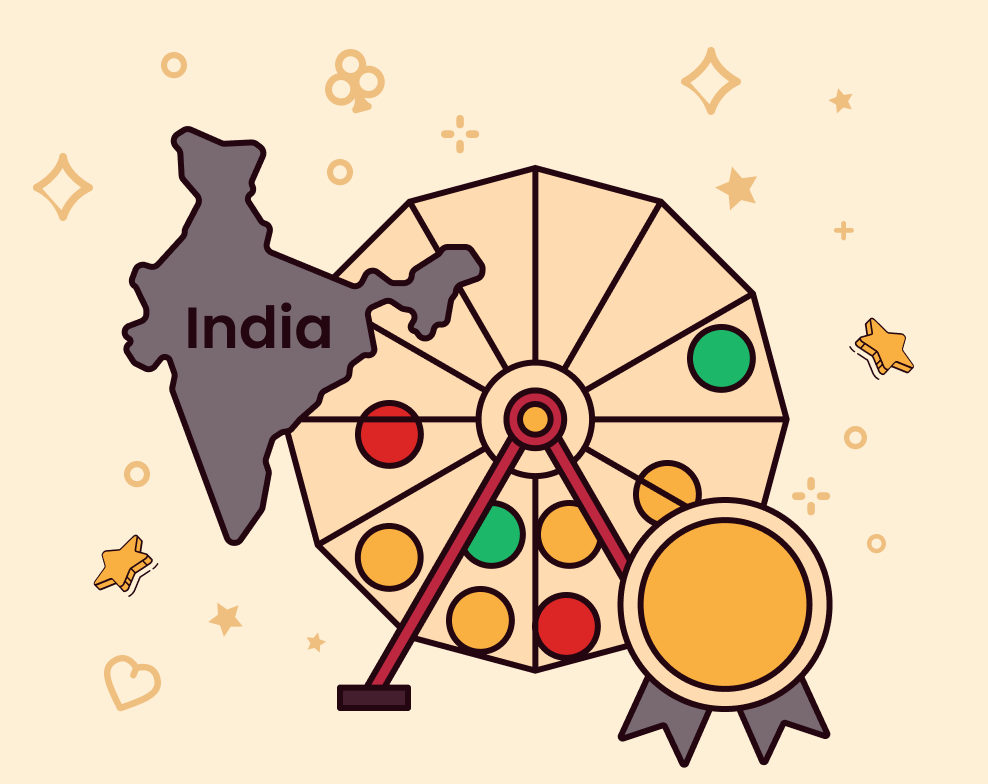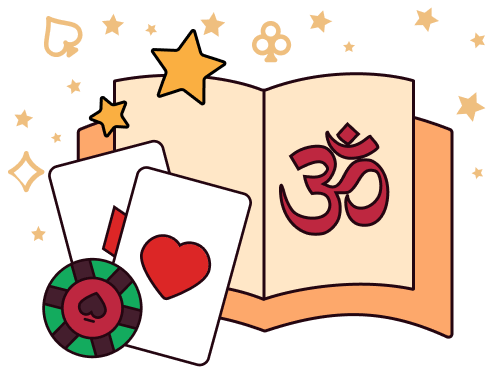
India is a country with a 6,000-year history, so it’s not surprising that it has witnessed a massive transformation across all sectors. Ancient Indian societies were broken into smaller fragments, with villages the most significant and closely knit units. They played games as a form of entertainment and to bring the community together.
In modern India, gambling has become a popular pastime, and you can enjoy a range of classic casino games such as blackjack, roulette and baccarat alongside traditional Indian games like rummy and Andar Bahar. Discover how gambling games played in India have evolved over the years below.
Popular choice of games
Dice games, wrestling and betting on animal races and fights were popular with Indians during ancient times as they provided a way to make extra money or showcase skill.
Dice or Pachisi
Dice games have long been popular in India, and many variations have since come to the forefront. Originally, dice were made of two wooden sticks that were rubbed together in the palm and rolled onto the floor.
Until the 20th century, these were substituted by cowries, which people with low incomes used as a currency. They would play board-and-dice games that went by the names of Aksa, Chaupar, Pachisi and Pasha, to name a few.
Several Buddhist texts dating back to 300 BC mention dice made from Vibhikta tree nuts. The highest value the dice or cowries could reach was 25. Hence, Pachisi was prevalent, as outlined in the popular epic of Mahabharata.
Animal or bird fights
Cockfighting dates back to the Indus Valley civilisation. It slowly spread across the rest of Asia and is even now practised in the hinterlands of India, despite being banned by the Indian government. Ram fights were also a popular game which people used to bet on, with gamblers betting in favour of or against one of two rams.
Chariot/horse racing
Royal families would race horses or chariots between 1500 BC and 1000 BC. There were also times when they would enslave people to participate instead. This form of entertainment shares similarities with the gladiator events held in Roman arenas. However, only a little can be found documented about betting on these races.
Wrestling
Wrestling has been popular in India since ancient times, and while most used it as an excuse to keep fit, others participated in wrestling matches. Warriors and soldiers would also take part to demonstrate their bravery and skill, and bettors would wager on their favourite contenders. However, while the physical fitness required for wrestling took the form of discipline, the urge to bet on these “fight clubs” diminished after the British came to power.

Looking back to the earliest scriptures
1. Rig Veda: The earliest of the Vedas mention gambling, which shows how advanced prior Indian civilisations were and how well-planned their social rules were. The 10th book of the Rig Veda advocated and urged men to quit gambling as “the wife will be left wretched and forlorn, and the mother will have to mourn the loss of a son who wanders homeless”. It goes on to say that the son may be tempted to steal money to gamble more and, instead of playing with dice, should cultivate corn on his land and tend his cattle with his wife.
2. Atharvaveda: Another point of view on gambling in ancient India comes to the forefront from this Hymn XXXVIII. There is a reference to using a particular charm to get success in gambling, and this is by invoking the apsaras.
3. Manusmriti: In the ancient Manusmriti, we can see how Indian society viewed gambling and took steps to regulate it. For instance, verses 9.220-227 state:
द्यूतं समाह्वयं चैव राजा राष्ट्रात्निवारयेत् । राजान्तकरणावेतौ द्वौ दोषौ पृथिवीक्षिताम् ॥ २२१ ॥ dyūtaṃ samāhvayaṃ caiva rājā rāṣṭrātnivārayet | rājāntakaraṇāvetau dvau doṣau pṛthivīkṣitām || 221 ||
They believed that the king should exclude or remove gambling and betting, as they were considered evils which would lead to the destruction of the kingdoms. Likewise, the text also ordained that the king shall suppress such activities, per line 222.
4. Yagnavalkya: Another crucial Vedic scripture after Manusmriti in which the gambling rules of ancient India come to light is the Yagnavalkya. His verses call for the legalisation of gambling, to bring it under the purview of the ruler or the state to earn revenue. This was a different point of view from the Manusmriti, as he was not against gambling altogether. He spoke of nine laws or Prakaranas, two of which dealt with betting and gambling.
5. Arthashastra: An exceptionally wise minister, Vishnugupta, also known as Kautilya or Chanakya, wrote Arthashastra, which pertained to the social and political insights of ancient India between 321 and 296 BC.
Under this, he stated the need to gamble under the supervision of the king and a penalty of 12 panas if the gamblers were caught playing elsewhere. There would be a superintendent, and he would supply dice at the rate of a kakani of hire per pair. Players making any foul play would be punished for any tricks of hand with 12 panas. They would also be made to forfeit the stakes which they had won. The superintendent would claim 5% of the winning amount, as well as a fee for providing water, dice and accommodation.
6.Nalopakhyana: The story of Nala and Damayanti from the Nalopakhyana is well known, and here we also find mentions of gambling with dice. Nala’s love for gambling leads him to lose his kingdom, his chariot, and all of his wealth. He has to wander around after, leading to much of a despair.
7. Ramayana: We find the mention of gambling in the highly regarded epic of Ramayana. Here, the author Valmiki has not condoned or referred to it as a taboo, nor described it as social documentary. Instead, we find references to Aksa and he even points out how the defeated gamblers looked like trees devoid of fruits.
8. Mahabharata: Written around 3200 BC, Mahabharata is a full-length epic of which a significant portion is centred around the game of dice or pasa. The epic is about the war between two clans, Kauravas and Pandavas, and their fight for the throne of Indraprastha.
Shakuni invites Yudhishtira, the eldest brother of Pandavas, for a game of dice. Shakuni was an expert in the game, while Yudhishtira was a righteous man with a weakness for gambling. Shakuni manipulated Yudhishtira, causing him to lose his kingdom and all of his wealth and enter a 13-year exile. The entire set of events in Mahabharata portrays the vices of gambling and the ways it can have profound implications.

Other historical documents talking about gambling
Brihaspati, in verse 26.1.2, states that Manu condoned gambling as it destroys truth, honesty, and wealth. However, it says it can take place under the supervision of game housekeepers. As per Narada, in verse 17.18, the gamblers shall pay a share to the king and play in public, thereby causing no wrong deed. Moreover, Katyayana, in Vivadaratnakara p. 612, notes the keeper of the gambling house should arrange the game, pay the dues and receive a 10% interest from the gamblers.
Where India stands today with regard to gambling
Looking back at most of these texts, one thing is clear – most ancient Indian authors spoke of regulating gambling. A few of them vocalised a ban on it, while others claimed that it should be continued, provided that it is overseen by a reputable individual in gambling houses and “taxed”.
In the 18th century, the British introduced India to cricket, with the first matches held in Calcutta and Madras during 1864. By 1867, gambling houses had mushroomed all over the country, and the Public Gambling Act was enacted.
While the Public Gambling Act remains in force today, states may enact their own laws on gambling activities at both offshore sites and online casinos. Currently, the only states that permit gambling are Goa, Daman and Sikkim. For the rest of India, most forms of gambling are still illegal, with the exception of games of skill such as rummy and poker.
Read our dedicated gambling guides to learn more about the various types of casino games available to play in India.
The Latest News


Akil Khan
•March 1, 2024
Casino games, poker and sports betting are becoming popular among Indian gamblers, with the ever-evolving digital landscape and higher penetration of the internet and mobile devices causing revolutionary change.
Statista reports that in 2024, India's online gambling market will hit $2.9 billion, driven by the increase in smartphones, with everything from slots and table games to rummy and Teen Patti available to play on mobile.
Today, India has over 900 million internet users, 40% of whom have gambled on online gambling platforms at least once. So, not only are brick-and-mortar casinos in states such as Goa, Sikkim, and Daman booming, but regulated online casinos are also fast becoming popular.
Fantasy sports are thriving, with millions of young Indian players signing up to sites such as Parimatch and Dream11 to play cricket, hockey, football and kabaddi, among other popular sports. Learn more about casinos' impact on Indian youth in recent years and why people are shifting more towards this billion-dollar sector after the pandemic.


Ana D.
•May 30, 2024
Lotteries and other forms of gambling have a colourful history in India. While lotteries are regulated under a central umbrella, how they are managed is subject to the discretion of state governments. However, the growing popularity of lotteries saw the Lotteries (Regulation) Act of 1998 and the Lotteries (Regulation) Rules 2010 introduced, which established detailed standards for the governments to follow.
Currently, lottery games are legal in 13 Indian states, though anyone of legal gambling age in India can buy international lottery tickets online. The ticket prices and prize pools of government lotteries in India vary depending on the lottery scheme and state in which it is regulated. Tickets for weekly draws begin at modest prices like ₹2 or ₹5 and increase for bumper draws and special schemes.


Akil Khan
•March 21, 2024
Whether you like it or not, luck plays a crucial role in gambling. And while many would argue that it’s an unreliable force, for many Indians, the ancient tradition of Vedic astrology offers a way to understand how luck works in the universe and how one could potentially manipulate it to work in one’s favour.
Vedic astrology (known as Jyotish in Sanskrit) is the practice of studying planetary positions, celestial influences, and karmic patterns to understand how these influence and shape human lives and destinies.
When it comes to gambling, some Indians look to Vedic astrology to boost their chances of success. By analysing astrological charts and horoscopes, and identifying cosmic connections, gamblers seek to find the most advantageous time to gamble, looking for lucky combinations of numbers, or even charms and rituals to help improve their chances.
Let’s look at this more closely:
Planetary configurations
"Muhurtha", an essential principle of Vedic astrology, indicates the opportune time to partake in certain activities based on planetary configurations. It also highlights when best to avoid certain activities. So, in the case of gambling, a player would wait for a favourable Muhurtha to maximise their chances of success.
Presence of the planets
Vedic astrology focuses on nine “grahas”, which are collectively referred to as the “navagrahas” (nava meaning nine). They include the sun (Surya), moon (Chandra), Mars (Mangala), Mercury (Budha), Jupiter (Brihaspati), Venus (Shukra), Saturn (Shani), Rahu (north node of the moon), and Ketu (south node of the moon). According to Vedic astrology, the planet Venus offers luxury and Jupiter provides immense wealth. A conjunction of Jupiter and Venus unafflicted with the moon is therefore said to bring good luck and prosperity.
Birth charts
Many Indians strongly believe in analysing their birth chart in every aspect of their life. This comes from Vedic astrology, which argues that the alignment of different celestial bodies at your birth can provide invaluable insights. In the case of betting, it could highlight a person’s gambling and risk-taking tendencies and subsequent strategies they could employ to maximise their chances of winning, translating into profits and success.
Astrology and numerology
Hindus love to rely on their favourite numbers, particularly when it comes to gambling, and generally prefer odd numbers over even. Seven and eight are considered auspicious numbers, representing success and prosperity. Many Hindus also use these numbers at the time of Diwali when, in some houses, gambling is a ritual. Another lucky sequence of numbers in Hinduism is 786, representing the Trinity of Brahma, Vishnu, and Shiva.